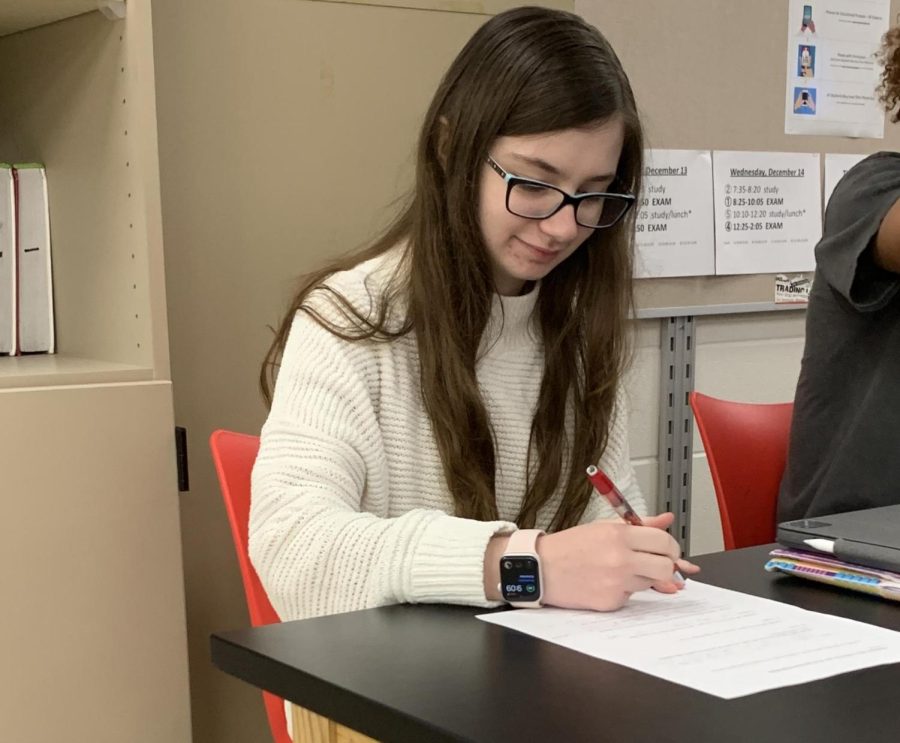Fixing finals
Sophomore Natalie Doyle studies for her upcoming Physics test.
December 9, 2022
When you hear the words “finals week,” what is the first thing you think of? Some of you may immediately think of stress and anxiety over passing your exams, while others may think of late nights spent studying information from the entire year. Finals and midterms are typically seen as a negative experience that many of us dread.
While semester finals may not be the most effective way to test our retention of the year’s material, they can be improved to be more effective and cause fewer problems while keeping the benefits of the traditional finals.
Benefits? What benefits?! Final exams show how much we have learned, allowing our teachers to see what areas they need to go over the next semester and what material some students may need help understanding. Teachers can then use the scores to determine whether or not a student is struggling with the material and then be able to advise the student on how to improve. By being able to help students know what they need help on, some of the anxiety can be lifted off students’ shoulders.
While the main point of finals is to show that we have retained material from the semester, finals also help to make sure we still retain the information after the class ends. The article, “The Effect of a Final Exam on Long-Term Retention,” describes how psychology students who took a long-term retention test four to five months after their class had finished earned 79% on the questions that were like those on their final while getting 67% on the questions that hadn’t been on the final.
The data shows that the final exam provided the students a chance to go over the information they had learned throughout the term, helping them remember it even after the class had finished. This means that even after we finish our classes, our finals will help us to remember the material we learned.
In addition, when students are told they will have a final exam at the end of the semester or year, they tend to form better study habits, which can lead to higher scores on their finals. The article, “Expectations of a final cumulative test enhances long-term relations,” explains that students who find out about their finals at the beginning of the year continue going over their study materials after the test.This can create good study habits for years to come.
Finally, finals can help prepare you for future tests similar to the exams. Tests like the SAT take from two to three hours to complete, which is a large amount of time to stay sitting even with the breaks, while finals take around 1.5 hours. Both of these tests take close to the same amount of time to complete.
Both types of tests require some amount of studying in order to score well. They also can both affect your college applications, as one affects your GPA and the other is required by some colleges. By taking finals, you pick up study habits and learn ways to better prepare themselves for these larger exams.
Despite all this, cumulative finals do bring an abundance of stress to students when they come around, causing many of us to study far into the night to try to remember all the information that we may need. According to a study done by Pew Social Trends, 31% of students in the U.S. cited finals and midterms as their main source of stress during the school year.
This stress can exacerbate problems that the students already have and can cause more problems for them as they attempt to prepare themselves for their exams, which are usually 10-20% of their grade. With all that stress, some students even have their grades slip or start forming bad habits.
Although this may be true, the stress we feel before our exams could be decreased greatly by having our finals be accompanied by more retrieval practices. Retrieval practices are shorter, less time consuming quizzes and reviews that are over content throughout the year. By using these throughout the semester, students could be better prepared for final exams and midterms. The article, “Test-enhanced learning: Using Retrieval practice to help students learn,” explains that students who had done a type of retrieval practice answered twice as many questions correctly right on their final exams when compared to students that had none.
Retrieval practices students could try next semester would be things like using Quizlet or Quizziz to go over material through the semester, not just before a test. Students could make flashcards they would use all semester. Or they could simply review their notes all semester, not just in preparation for tests.
Through the use of retrieval practices, we can be better prepared for finals, which would help to take some of the stress off of our shoulders and allow us to not have to stay up all night trying to study everything.
Finals, no matter how much stress they may bring to us, are indeed beneficial to both our learning and to our teachers, but improvements can still be made in order to help us retain information from earlier in the semester and have less stress such as using retrieval practices. In addition, finals help to prepare students for standardized tests, retain the information long term and show how much students have learned. Even by simply knowing about the final, students end up performing better on them.















